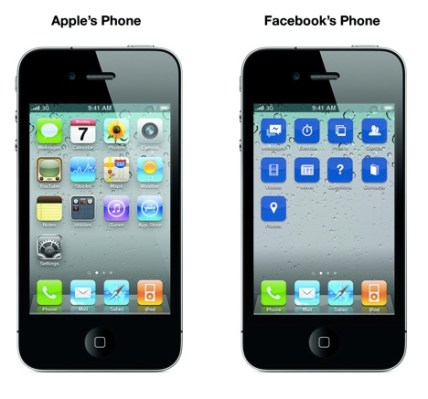In The Facebook Effect, David Kirkpatrick posits the great social network is the one entity that could bully Apple, today’s most powerful technology company. As the iPhone and other iOS devices have paved the way toward an unprecedented level of convergence, the collective power of Facebook’s user base presents a daunting challenge to Apple: specifically, could Facebook literally imprint its own applications on iOS devices, most notably the iPhone, to the point where it could, theoretically, transform the device into “The Facebook Phone” without ever having built its own hardware and/or standard mobile operating system?
At the moment, Facebook is believed to be undertaking what has been dubbed “Project Spartan,” its own Trojan Horse for stitching its social layer into multiple mobile platforms in lieu of building its own phone (like Apple) and/or its own mobile operating system (like Android). As “Spartan” has been written about before in detail (which I won’t recount here), the basic idea, as it applies to Apple, is the development and rollout of multiple HTML5 applications which would allow Facebook to create a range of mobile applications without having to adhere to the rules and toll charges imposed by Apple’s app-store.
Now, let’s consider an alternative scenario: What if Facebook releases an entire suite of iOS apps, as fast as “Messenger” (which feels faster than SMS) and powered by users’ own social networks? (See mock image created by Sahil Lavingia, above.)
Specifically, what if Facebook decides to apply resources to construct a full “suite” of federated yet interconnected native iPhone and iPad applications to satisfy a number of interactions within Facebook, entirely powered by your friends? Consider, for a moment, the possibility of having individual apps for asking questions, playing games, sharing pictures and videos, digesting your newsfeed, listening to music with friends, accessing your address book, participating in groups, viewing pictures and videos, and so on. You could have them all, or just use a few. I’m not suggesting that it will happen, but theoretically, Facebook has the muscle to create these apps and, with its huge user base, they would be downloaded in droves.
A few months ago, Apple announced a partnership to tie Twitter into its operating system. Many lauded the deal as a win for both sides, and to be sure, it is a great idea. But to be fair, it also underscores the lengths to which Apple, a company without a social network and notorious for wanting to control its platform, made strange bedfellows with Twitter. Earlier, when Apple had tried to bake Facebook into its iTunes player experience, Ping, apparently it didn’t work out because one side exerted more strength than the other. Guess who?
Whether Project Spartan continues, or whether Facebook builds out all these native iOS apps, Facebook will increasingly become the mobile identity gatekeeper and power source behind some of the newer application layer services. For example, one of the most anticipated iPhone apps to arrive this month is Turntable.fm, which requires that users login via Facebook only.
One thing is clear: Facebook is determined to get onto your iPhone. And your Android, and any other major mobile platform, too. The number of platforms doesn’t matter—this game is platform-agnostic. It will either build its own “lingua franca” for mobile via HTML5, or maybe it will build an entire fleet of apps. Or, they Facebook simply improve upon its current iOS app and not fragment the experience. Or, maybe it will develop its own mobile operating system (like Android) or, shoot, maybe build its own phone (Apple). Well, maybe those aren’t as likely, but given what we’ve seen in the last few months, with Google buying Motorola, and with Android use growing and iPhone profits skyrocketing, expect Facebook to do something big, something ambitious, and something that leverages its massive user base to penetrate the fabric of the mobile experience with social, by all means necessary.
Photo illustration by Sahil Lavingia.
